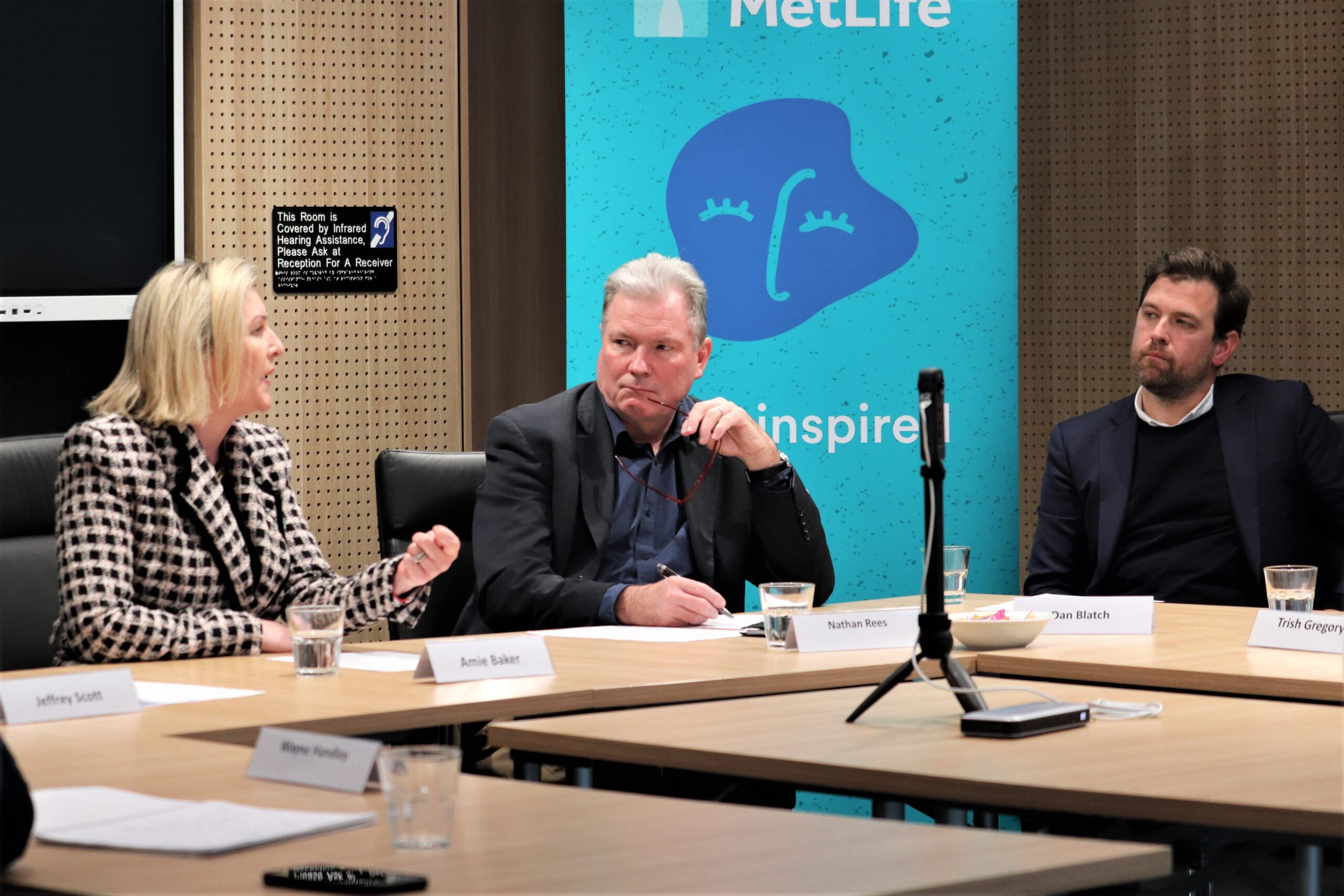Our report on the alternative solutions being outlined by advisers and other industry stakeholders to address concerns that remuneration for life insurance advice remains commercially inadequate attracted strong reader interest this week…
Alternative solutions are being outlined by advisers and other industry stakeholders to address concerns that remuneration for life insurance advice remains commercially inadequate.
Such solutions, if implemented, would contribute to an outcome allowing more advisers to deliver more life insurance advice and support services to more Australians.
This is the collective view of many, including a selection of industry peers participating in the recent Industry Round Table event jointly hosted by MetLife Australia and Riskinfo.
One of the issues stifling public debate on the commercial adequacy of the current 60/20 commission caps mandated under the Life Insurance Framework reforms has been the challenge confronting the life insurance industry and advice sector simply to retain commissions at all – especially given predispositions held by Financial Services Minister, Stephen Jones and Quality of Advice Review leader, Michelle Levy, both of whom had been open to considering whether the exception to the broader ban on conflicted remuneration should continue to apply to life insurance advice.
Given a total ban on risk commissions was a potential outcome of the Quality of Advice Review – an outcome also advocated under certain conditions by Banking Royal Commissioner, Kenneth Hayne, various advocacy groups appear to have been reluctant during the Quality of Advice Review debate to do anything more than lobby for the retention of risk commissions. It was felt by some that this was not the time to call for increases to the commission caps.
…attention may now be gradually turning …to consideration of the entire way in which financial advisers and advice businesses are remunerated
With the future of life insurance commissions finally assured – at least for the foreseeable future – by Minister Jones in June, attention may now be gradually turning both to whether the current commission caps allow a healthy and viable life insurance advice sector and also to consideration of the entire way in which financial advisers and advice businesses are remunerated and recompensed for the time and effort it takes to:
- Onboard new life insurance clients
- Manage and retain existing clients
- Adequately service clients when the rubber hits the road at claim time
Four key opportunities were identified and discussed at the MetLife Round Table, each of which would serve to make the delivery of life insurance advice services more commercially attractive for both existing advisers and new entrants:
1. Reduce costs of delivering life insurance advice
While MetLife’s Head of Advice Strategy, Jeffrey Scott, is pleased that life insurance commissions have been retained, he says the next question becomes one of whether the current commission arrangement is appropriate to the cost to serve.
He asks whether the removal of SoAs and hopefully introduction of other efficiencies under the QoA reforms will sufficiently lower the cost to serve to such an extent that would make the current 60/20 commission caps sufficient remuneration to allow advisers to service the mums and dads market. He says the sector should see how the efficiency reforms play out to determine whether the mums and dads market is a group that advisers can again commercially afford to serve.
“If 60/20 works, that’s great – but if not, let’s look at how risk advisers are remunerated for what they’ve been doing,” says Scott.
MetLife’s Head of External Affairs and Public Policy, Nathan Rees, agrees that it remains premature to discuss alterations to current commission caps until the impact of the QoA Review reforms on the cost of delivering advice can be assessed.
2. Introduce administration service fees
Bombora founder and MD, Wayne Handley, is one who would welcome a total review of the way in which advisers are remunerated for delivering life insurance and related advice services.
He believes, given the time and energy now spent by practitioners and their staff in managing life insurance portfolios, that an administration service fee paid by the insurer to the business is justified.
Riskinfo will explore this suggestion in further detail in future reporting.
3. Expand financial planning benefits to include claims service fees
Specialist risk advice practitioner, Dan Blatch, says the role the adviser plays at claims time needs to be far more rewarded.
Blatch says he personally spends an average of around 12 – 16 hours on each of his clients’ claims and should the adviser wish to be involved at claim time, their remuneration should reflect that effort.
A similar line of thinking was articulated by Scott, who questioned whether the financial planning benefit feature, common in many life insurance contracts outside superannuation could be reconfigured to include the provision of a claims services benefit, typically around $3,000 – $4,000. Blatch suggests a more realistic reflection of the value delivered by advisers – given average time spent servicing their clients at claim time – might be closer to $6,000 plus GST.
4. Increase commission caps
The fourth consideration is increasing existing commission caps. A common number broadly debated by the sector is increasing from 60/20 to 80/20, especially as this was a commercial level offered by insurers and adopted by advisers for many years before the implementation of the Life Insurance Framework reforms.
Such an increase would be supported by the advisers at the Round Table, especially after advisers Trish Gregory, Amie Baker and Dan Blatch each reflected on the “huge” time and effort expended by themselves and their support staff across all three areas of onboarding, maintenance and claims services.
There was strong agreement among the panel that resolving the issue of remuneration for life insurance advice services was a critical element in addressing the decimation of specialist risk adviser numbers and in finding a way for middle Australia – for the mums and dads market – to again have access to much-needed life insurance advice.
To review the full context of this discussion, take the following links:








I fear my commenting on this is starting resemble a broken record 🙂 This is nothing more than rearranging the deck chairs on the Titanic. All of the so-called ‘solutions’ can be distilled down to a commission by one description or another. All of the methods in the article represents an adviser receiving a slice of a payment made by the purchasing client. The same applies to clerks within the life company AND executive salaries and bonuses. Everything is a commission in one way or ‘tuther.
A classic commission is the simplest, cleanest and most transparent of all these methods mentioned in the articles. All these alternate methods are only attempts to conceal what is for all intents and purposes a commission – can’t people see this?!
Many who agree with me on this say 80/20 is the way to go. I say 100/20 is the only way forward that can come close to guaranteeing a future for specialist risk advice. 80/20 combined with 2 year claw-backs offers zero incentive for any ‘thinking’ adviser to build a business, whether it be a newbie adviser starting out OR one with 30+ years experience just wanting commensurate reward for effort.
You won’t see any growth in risk specialists before OR after 2026 UNLESS the 2 year claw-back is scrapped and made a 1 year clause (max) AND increase commissions to 100/20. No self respecting risk adviser would endure what he/she must, day to day, and accept anything less – certainly no experienced adviser would voluntarily.
THIS is what is needed to attract new people AND retain the experienced advisers who will be responsible for training the next generation. Forget the life company-run classrooms on risk advice. They have their place as a basic requirement only. Time in the field with a good experienced adviser is the only way for new people to learn the soft skills properly. Waste all the time and money you like rearranging all the deck chairs if you must. Nothing less than 100/20 and 1 year claw-back will do. While you’re at it, add that 1-year clawback to everyone else who gets some of that client premium (their commission) ESPECIALLY the executive bonuses! Save everyone a LOT of trouble and do it now.
This is nothing more than rearranging the deck chairs on the Titanic. All of the so-called ‘solutions’ can be distilled down to a commission by one description or another. It is an adviser receiving a slice of a payment made by the purchasing client.
A commission is the simplest, cleanest and most transparent of all these methods. All these alternate methods are only attempts to conceal what is for all intents and purposes a commission – can’t people see this?!
Many who agree with me on this say 80/20 is the way to go. I say 100/20 is the only way forward that can come close to guaranteeing a future for specialist risk advice. 80/20 combined with 2 year claw-backs offers zero incentive for any ‘thinking’ adviser to build a business, whether it be a newbie adviser starting out OR one with 30+ years experience just wanting commensurate reward for effort.
You won’t see any growth in risk specialists before OR after 2026 UNLESS the 2 year claw-back is scrapped and made a 1 year clause (max) AND increase commissions to 100/20. No self respecting risk adviser would endure what he must, day to day, and accept anything less – certainly no experienced adviser.
THIS is what is needed to attract new people AND retain the experienced advisers who will be responsible for training the next generation. Waste all the time and money rearranging all the deck chairs you like. Nothing less than 100/20 and 1 year claw-back will do. Save everyone a LOT of trouble and do it now.
Comments are closed.